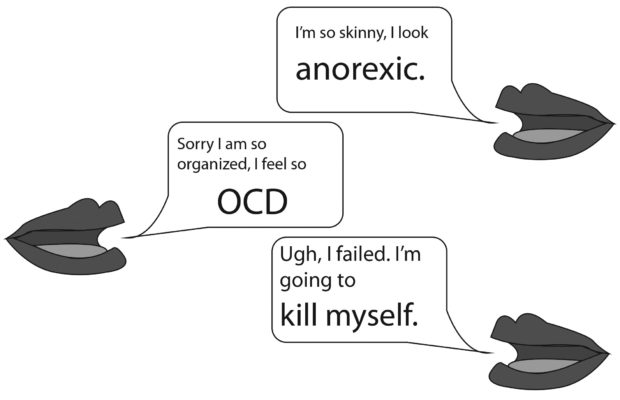Mental illnesses are no joke

As our society evolves and advances, stress and anxiety levels have rapidly increased, leading to mental illnesses and the struggles that come with them. According to Recovery Village, one in five Americans today suffer from mental illness. This era has brought awareness about mental health disorders and its treatments, as more students and adults alike are diagnosed with ADHD, anxiety, OCD, depression and millions of other illnesses. Unfortunately, with this comes discrimination and trivialization of the matter.
Since this day and age has allowed more people to become transparent with their disorders, some may feel they can say they have them too, without any actual diagnosis. In reality, they may have never felt the pain of actually having one. There are many students at our school who are diagnosed with anxiety and depression who go through dark periods where talking, eating and getting out of bed is a feat. They are left grappling with their own mind, trying to escape the horrible thoughts that they try to push out of their head. Everyone is different in their experiences, so some may actually be ok with going public with their struggles and get the reassurance they need on social media, but sometimes it can be hard to tell if their message is genuine, as social media makes it hard to see their true character.
Unfortunately, some believe that it is acceptable to self-diagnose themselves with certain mental illnesses. People can read about symptoms online and believe that they too have a mental illness, but are unaware of the timeline needed for a diagnosis. For instance, a person cannot say they have a headache and then claim they have brain cancer. A common example of this misuse is when another student says, “I’m sorry I’m so organized, this gives me OCD.” OCD, Obsessive Compulsive Disorder, is an anxiety disorder in which people have recurring, unwanted thoughts or ideas that make them feel driven to do something repetitively. People using these terms may claim that they have OCD because they are “organized,” but many haven’t gone through the experience of being diagnosed, struggling in their day to day life, or having to see a therapist for these conditions. Though some with this disorder may feel the need to be organized, the disorder can surround so much more than that, and should not only be interpreted this way.
Ignorance breeds intolerance, so bringing awareness to the actual symptoms and process of diagnosis is the key to creating an inclusive environment for those who have mental disorders. Those diagnosed with disorders like anxiety, ADHD and depression face years of struggling through therapy and fighting against their own mind, but this is sometimes lost amongst students and adults alike. If they were to be informed about mental disorders, they would also learn about how their lack of understanding can offend those who face the real struggles of mental illness every day.
Self diagnosing and trivializing mental illness feels like a slap in the face to those who work hard constantly in their everyday battles with disabilities. Yes, people experience natural feelings of depression and anxiety in everyday life, but just because one feels these emotions occasionally does not necessarily mean they have a mental illness. More education and awareness is a simple fix to these issues.



